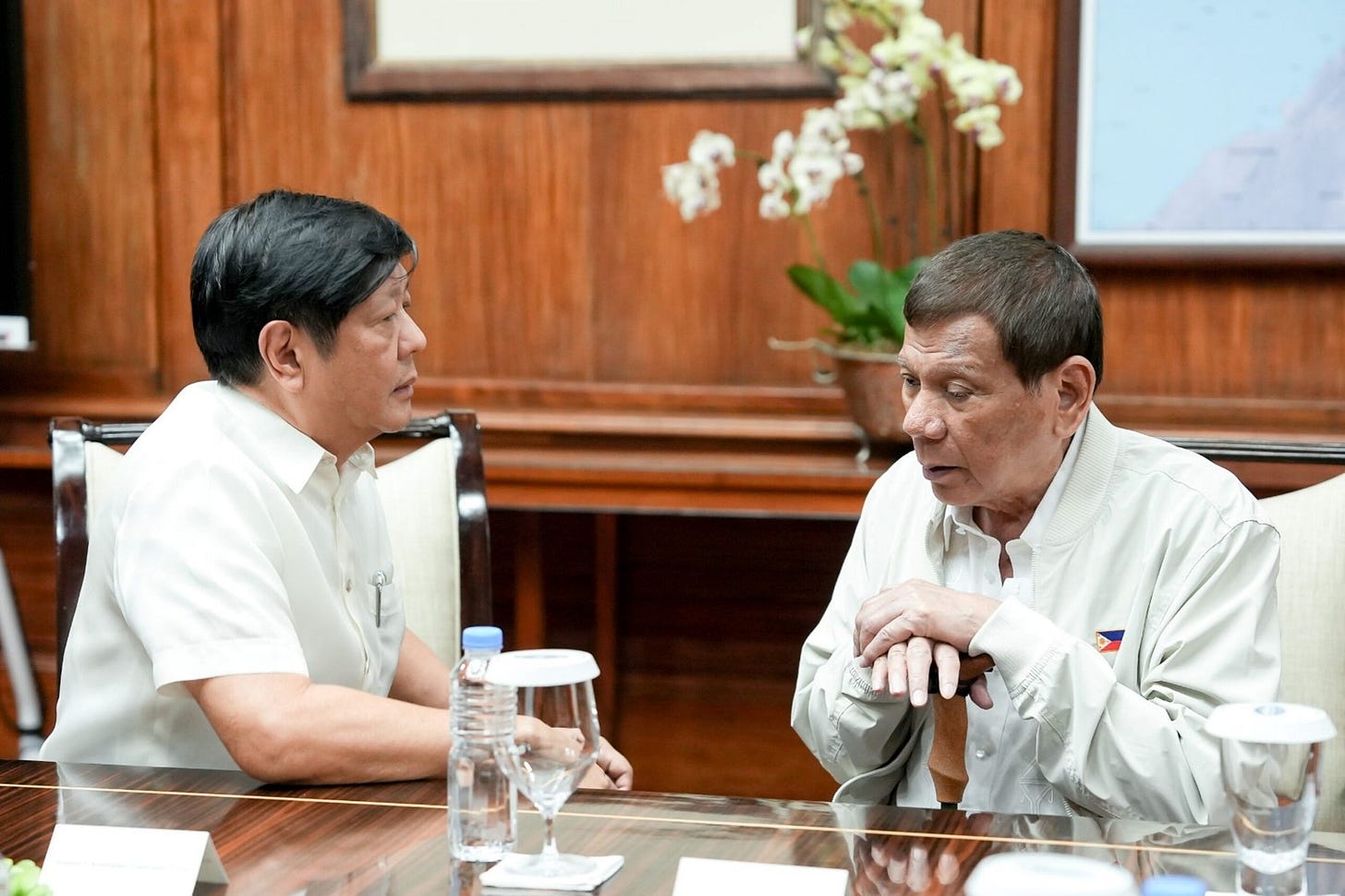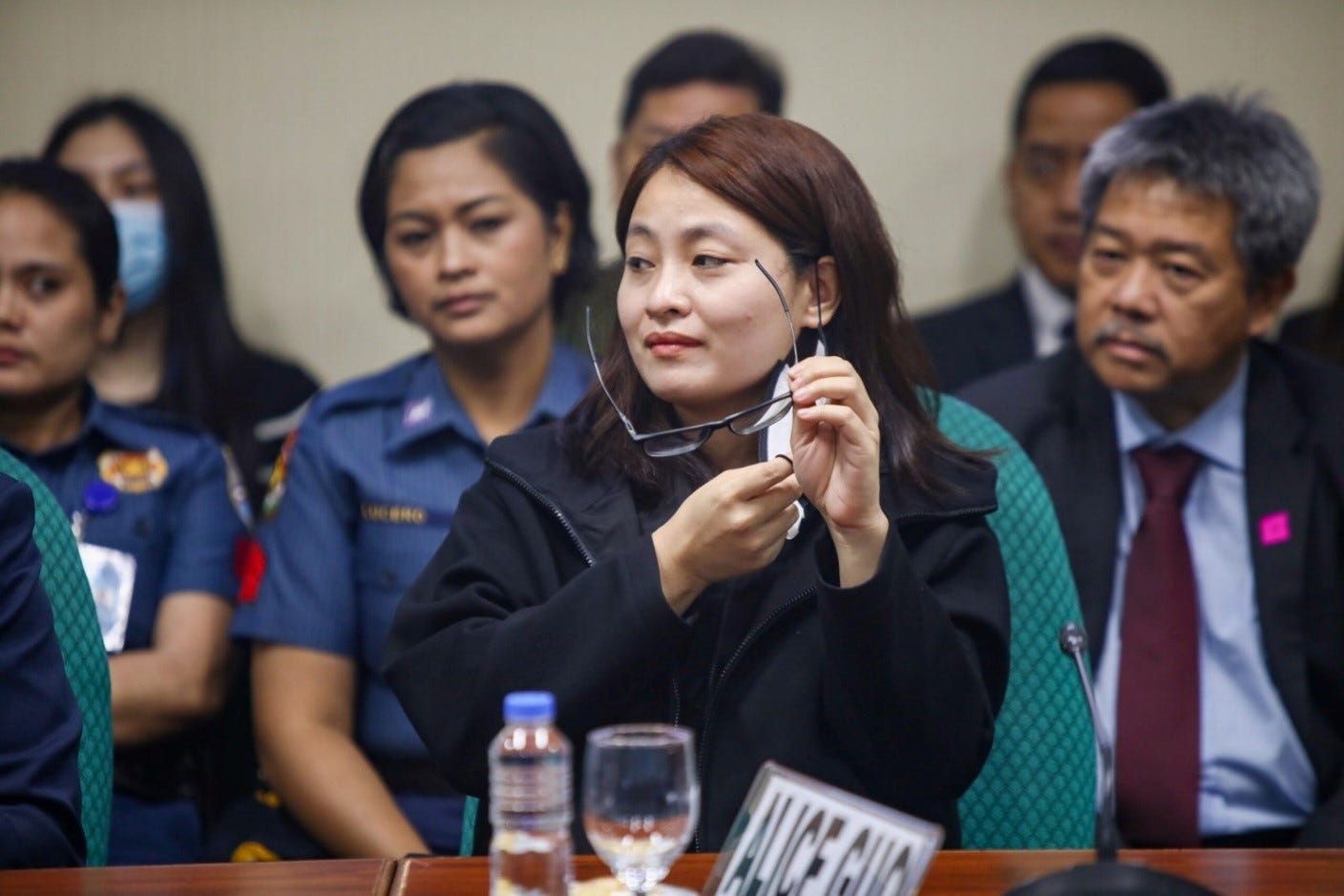Duterte-Marcos War Breaks Into the Open
Televangelist’s arrest a signal of Duterte’s waning power
The September 9 arrest by Philippine National Police of the globetrotting preacher Apollo Carreon Quiboloy, founder of the Kingdom of Jesus Christ, and a supposed spiritual adviser to former president Rodrigo R. Duterte, after a 16-day standoff, is a defining chapter in the contest for Philippine political dominance that began shortly after Ferdinand Marcos Jr. replaced Duterte as president in 2022. It is a signal that the machinery of government is slowly turning against the Duterte forces and raises questions about whether eventually, Marcos would turn Duterte over to the International Criminal Court to stand trial for his role in ordering a “war on drugs” which has taken the lives of thousands of mostly poor drug users.
The vendetta between the two camps pits the two most powerful political forces in the Philippines against each other. It is a struggle between the scion of a vastly corrupt dynasty who seemingly is trying to redeem its reputation, and another whose rough-hewn patriarch started a bloody drug war during his presidency that has accomplished little beyond taking the lives of the powerless in extrajudicial killings by often-corrupt police in league with death squads.
At the moment, an agreement to surrender Duterte to the ICC is unlikely, given his residual influence, although Marcos recently mused that he’s considering rejoining the international court, from which Duterte withdrew in March 2019. Duterte remains popular throughout the country, with a solid base in the national police, and may well run for a senate seat in the May 2025 elections, along with his two sons, making the Duterte dynasty, which served as the backbone of the " "UniTeam" alliance that brought the Marcoses back to power two years ago, the main opposition force. Duterte’s daughter Sara, the vice president, who swiftly disassociated herself from the Marcos unity team, remains the most popular politician in the country but is losing steam under questions about spending by her office.
The 74-year-old Quiboloy, with millions of believers scattered across the planet, was indicted in 2021 by a US federal grand jury along with other church officials on charges including conspiracy to engage in sex trafficking by force, child sex trafficking and fraud for allegedly recruiting young women and girls to serve as “pastorals,” and in some cases having sex with Quiboloy, also known as the Appointed Son of God, and others.
But the Name Above Every Name, as he is also known, had remained free since the indictment, holed up at his sprawling 75-acre New Jerusalem compound in Davao, the stronghold of the former president. On March 9, Duterte was named administrator of the extensive properties the Kingdom of Jesus Christ (KOJC) has stretching across the Philippines. The fact that law enforcement officials felt secure enough to exercise the US request for Quiboloy’s arrest is a sign that power is turning inexorably against the former president.
Sonshine (sic) Media Network International (SMNI), the media arm of the Kingdom of Jesus, “was the last big media not controlled or playing ball with Marcos-Romualdez plus his vote bank of followers. And this brought the fight right into the Dutertes’ home turf and proved they’re enfeebled,” said a well-connected Filipino commentator. “Their pet courts were overruled and they have been emasculated.”
The National Telecommunications Commission in January ordered the indefinite suspension of SMNI’s radio and television stations after Sonshine failed to comply with an earlier 30-day NTC suspension order although its social media platform has continued to operate as it isn’t covered by the suspension directive.
Marcos said in a public statement that Quiboloy would receive “no special treatment.” The question is whether the televangelist will be extradited to stand trial in the US although Marcos’s office reported that the government hasn’t yet received an American extradition request. Marcos on September 9 said Quiboloy must face justice at home before he can be sent abroad.
Quiboloy’s alleged offenses make him more than just collateral damage. But it’s clear that he is a pawn in a bigger game that puts the former president at risk. A major ongoing investigation in the Senate into a massive affair involving Philippine offshore gaming operators, or POGOs, is obliquely aimed at Duterte, who allowed the crime-riddled mainland Chinese gaming operations to expand exponentially during his six-year reign, which began on June 30, 2016.
Officials of the National Bureau of Investigation in July said they had discovered around 1,200 fake birth certificates in Davao del Sur, Duterte’s stronghold. Prior to this, the bureau said they discovered around 200 fake birth certificates issued mostly to Chinese nationals by the civil registry. For weeks, legislative hearings by both the Senate and House have turned the POGO affair and a woman named Alice Guo, who was allegedly connected to one in Tarlac Province, into the biggest scandal in decades, as Asia Sentinel reported on May 22.
Guo escaped to Indonesia aboard a mysterious benefactor’s yacht but was arrested and brought back, now undergoing a circus of accusations in legislative hearings. “I have absolutely no doubt that Marcos is connected to (meddling in ) the Alice Guo affair,” said an official with a local country risk firm. Lawmakers allied with the administration are “tying this to Duterte. He allowed them to expand massively. There have always been allegations that he benefited.” His press secretary Harry Roque has been implicated.
The eventual target is Sara Duterte, who is all but certain to be the 2028 presidential frontrunner unless the Marcos forces in the legislature can figure out a way to impeach her or otherwise marginalize her. Social Weather Stations, one of the country’s more reliable polling firms, in August gave her a net satisfaction rating of +44, compared to Marcos at +27 and Marcos’s all-but-chosen successor, his cousin House Speaker Martin Romualdez, at only +29. The controversy surrounding Duterte’s use of confidential and intelligence funds (CIFs) has flagged serious questions about transparency, legality, and accountability within the government. The allocation and expenditure of these confidential funds have become a subject of public concern, and rightfully so.
For two years, lawmakers have questioned her use of PHP125 million typically associated with security forces and intelligence operations which she accessed through a transfer initiated by Marcos’ office. Two opposition senators exposed the irregular use and raised concerns about a subsequent request. The lawmakers are now insisting that Duterte detail how the funds were spent. Vice President Duterte, in a recent speech, said the funds serve as resources for the government to respond to unforeseen challenges, be it counterterrorism efforts or safeguarding the nation’s integrity and warned that “those who undermine the country’s security and progress also pose a threat to the very fabric of Philippine society.”
“The Marcos forces are trying to figure out how to marginalize her,” said a source in the human rights community. “They are unloading all their ammunition at this point against her.” Marcos will have his work cut out for him, with it looking likely the efforts to neutralize Sara will continue.
The Marcos strategy, so far, appears to be well thought out with a singular objective: undermine the Dutertes and prevent them from becoming a lasting menace. This strategy will be the cornerstone of the elections just nine months away. All 317 seats in the House of Representatives and 12 of the 24 seats in the Senate will be contested. Local elections will also be held for the executive and legislative branches in every province, city, and municipality. The first regular election to the Bangsamoro Parliament will be held within the general election after it was postponed in 2022.




